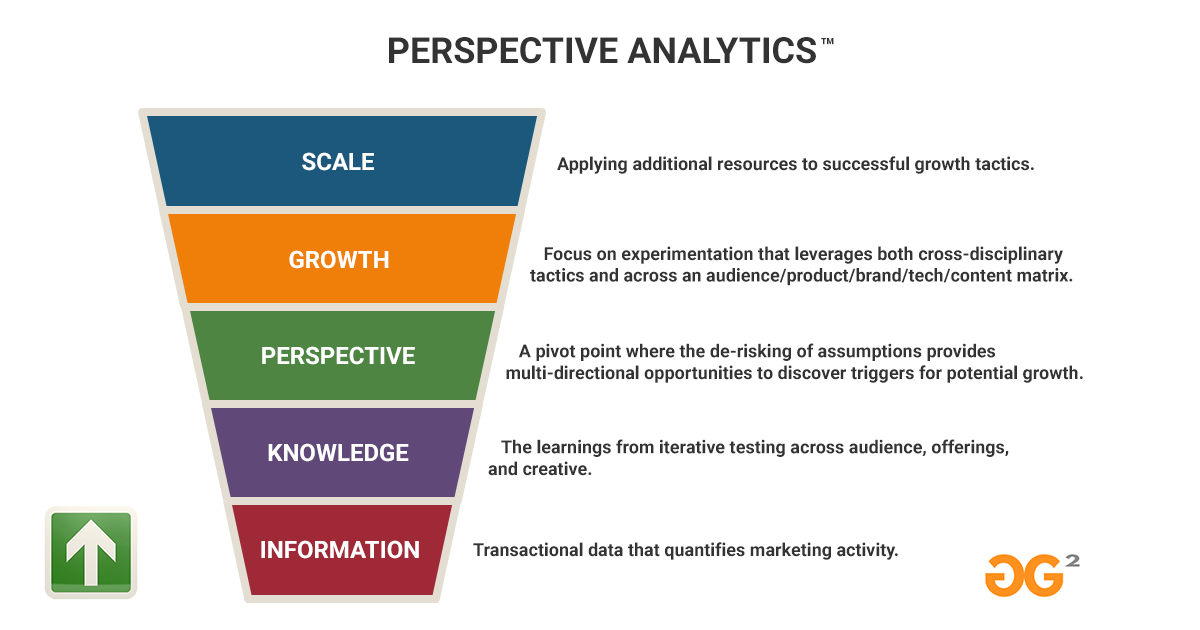Perspective Analytics: A Data-Driven Growth Process for Marketers
Updated 9/12/2024: Lean Marketing / Pv


What is Perspective Analytics
Perspective Analytics is a dynamic approach to marketing analytics that goes beyond traditional data monitoring and linear analyses. It emphasizes the generation of actionable insights and focuses on value-adds for the visitor or customer. The theory outlines several key principles that form the foundation of this approach:
Focus on value-adds for the visitor/customer
Rather than solely focusing on marketing activities, Perspective Analytics places a strong emphasis on delivering value to the visitor or customer. This means understanding their needs, preferences, and pain points, and tailoring marketing efforts to address those effectively.
Learn quickly what works and discard what doesn’t
The iterative testing process is essential in Perspective Analytics. It involves continuous experimentation and learning to identify effective strategies and tactics. By quickly recognizing what works and discarding what doesn’t, marketers can optimize their efforts and allocate resources more efficiently.
De-risk assumptions across the sales funnel
Assumptions are inherent in marketing strategies, but they also come with risks. Perspective Analytics aims to minimize these risks by actively testing and validating assumptions at each stage of the sales funnel. This approach helps marketers make data-driven decisions and reduces the reliance on guesswork.
Create adaptive responses to external parameters (pivot)
In a rapidly changing business environment, adaptability is crucial. Perspective Analytics encourages marketers to pivot their strategies based on external parameters such as market trends, competitor actions, or shifts in customer behavior. By proactively adjusting their approach, marketers can stay ahead of the curve and seize emerging opportunities.
Help establish a culture of systemic creativity and innovation
Perspective Analytics recognizes the importance of fostering a culture of creativity and innovation within marketing teams. By encouraging diverse perspectives, open communication, and an environment that values experimentation, marketers can unlock new ideas and approaches that drive growth and differentiation.
Building upon these principles, the Perspective Analytics approach encompasses five stages
Information
This stage involves gathering transactional data that quantifies marketing activity. It provides a foundation for further analysis and insights.
Knowledge
Knowledge is derived from analyzing the information collected in the previous stage. It encompasses facts, information, and skills acquired through iterative testing across various aspects such as audience segmentation, product offerings, and creative strategies.
Perspective
This stage represents a pivotal point where assumptions are de-risked, and multiple directions for potential growth are explored. By challenging existing assumptions and seeking diverse perspectives, marketers can identify triggers and opportunities that may have been overlooked.
Growth
In this stage, the focus is on experimentation and leveraging cross-disciplinary tactics. Marketers explore opportunities across the audience, product, brand, technology, and content matrix to discover incremental improvements that lead to growth. It involves a systematic and data-driven approach to identifying and optimizing marketing strategies.
Scale
Once successful growth tactics have been identified, this stage involves allocating additional resources to amplify and expand those strategies. As long as the trajectory of growth remains positive, scaling allows marketers to further capitalize on their successful approaches and drive even greater results.
To enhance the Perspective Analytics theory, we can delve into the following aspects:
Advanced analytics techniques
Incorporating advanced analytics techniques like predictive modeling, machine learning, and natural language processing can provide deeper insights and predictive capabilities. These techniques can help uncover patterns, detect trends, and anticipate customer behavior, enabling more informed decision-making.
Personalization and customer journey mapping
Applying Perspective Analytics to personalize the customer experience and map the customer journey can enhance engagement and drive conversion. By understanding individual preferences and delivering tailored messaging and offers at each touchpoint, marketers can create more meaningful interactions and improve overall customer satisfaction.
Integration of emerging technologies
The theory could be expanded to explore the integration of emerging technologies such as artificial intelligence, virtual reality, or augmented reality. These technologies offer new avenues for engaging customers, creating immersive experiences, and collecting
Perspective Analytics and Marketing Data Analysis
Updated 6/8/2023 - Perspective Analytics data analysis focuses on value-adds, iterative testing, de-risking assumptions, adaptive responses, and a culture of systemic creativity.
Marketing Frameworks for Startups – Discussion
Updated 1/12/2023 - We’re talking about marketing frameworks for start-ups which requires a flexible and growth minded marketing framework in order to discover and then accelerate growth.
The Benefits of a Lean Marketing Framework
Updated: 2/25/2023 - Modern lean marketing frameworks focus on ideation, iteration, testing, and adaptive measurement protocols to de-risk assumptions quickly and cost and resource effectively.
5 Benefits of Perspective Analytics in a Lean Marketing System™
Updated 12/3/2022 - Perspective analytics is a key element in a lean marketing system, targeting actionable insights v. data monitoring and more linear analyses from the data.
Marketing for Startups – 2 Buckets that Matter / RWO Marketing Group
Updated 8/3/2022 - Lead-gen analytics should be considered worthless unless you have a perspective analytics mindset around what your looking at, how it materialized (assumptions through end point), and where it can take you.
A Perspective on Lead Gen Analytics
Updated 9/6/2022 - Lead-gen analytics should be considered worthless unless you have a perspective analytics mindset around what your looking at, how it materialized (assumptions through end point), and where it can take you.
